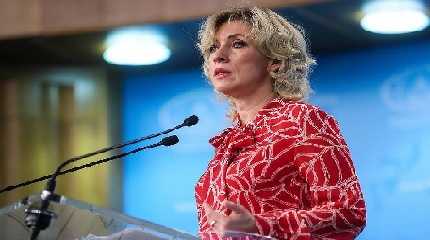
MOSCOW, February 11. /TASS/: Russia cannot accept the collective response of the EU and NATO to Russian Foreign Minister Sergey Lavrov’s message on the indivisibility of security, Foreign Ministry Spokeswoman Maria Zakharova stated on Friday.
"We cannot accept this collective response, which is more like ‘espirit de corps’. We are waiting for a detailed response from each side. Evading the question means that the West is not willing to recognize the obligations assumed within the OSCE and Russia-NATO and is trying to ensure its safety at our expense," the Russian diplomat emphasized.
Zakharova noted that the responses of NATO Secretary General Jens Stoltenberg and Vice-President of the European Commission Josep Borrell did not contain a substantive reaction to the question. "Let’s recall that Lavrov’s message was addressed to the foreign ministers of 37 European and North American states. And it emphasized specifically that we were expecting a comprehensive response in a national capacity," she said.
"Instead, [NATO Secretary General Jens] Stoltenberg and [EU foreign policy chief Josep] Borrell write to us, [although] we did not address them. Such a move cannot be characterized other than as a manifestation of diplomatic impoliteness and disrespect for our request," the diplomat added.
According to Zakharova, Russia strongly rejects NATO and EU dominance in providing security across the Euro-Atlantic region. "NATO and the EU insist on their dominant role in providing security in the Euro-Atlantic region," she said. "This approach is categorically unacceptable for us."
"The 1999 Charter for European Security and the 2010 Astana Declaration, adopted at the highest level by the OSCE, clearly stipulate that no state, group of states or organization can be given a superior right to maintaining peace and stability within the OSCE," the Russian diplomat said.
Lavrov’s message
On January 28, Russian Foreign Minister Sergey Lavrov sent a message on the indivisibility of security to his counterparts from several European countries, the US and Canada. On Thursday, Borrell stated on his Twitter that he had submitted his response to the Russian foreign minister, urging Moscow to hold dialogue and withdraw troops from Belarus, Ukrainian borders and Crimea. For his part, Stoltenberg noted that he also sent a letter calling for new round of talks on the Ukrainian crisis, military transparency, and arms control, including nuclear weapons.




